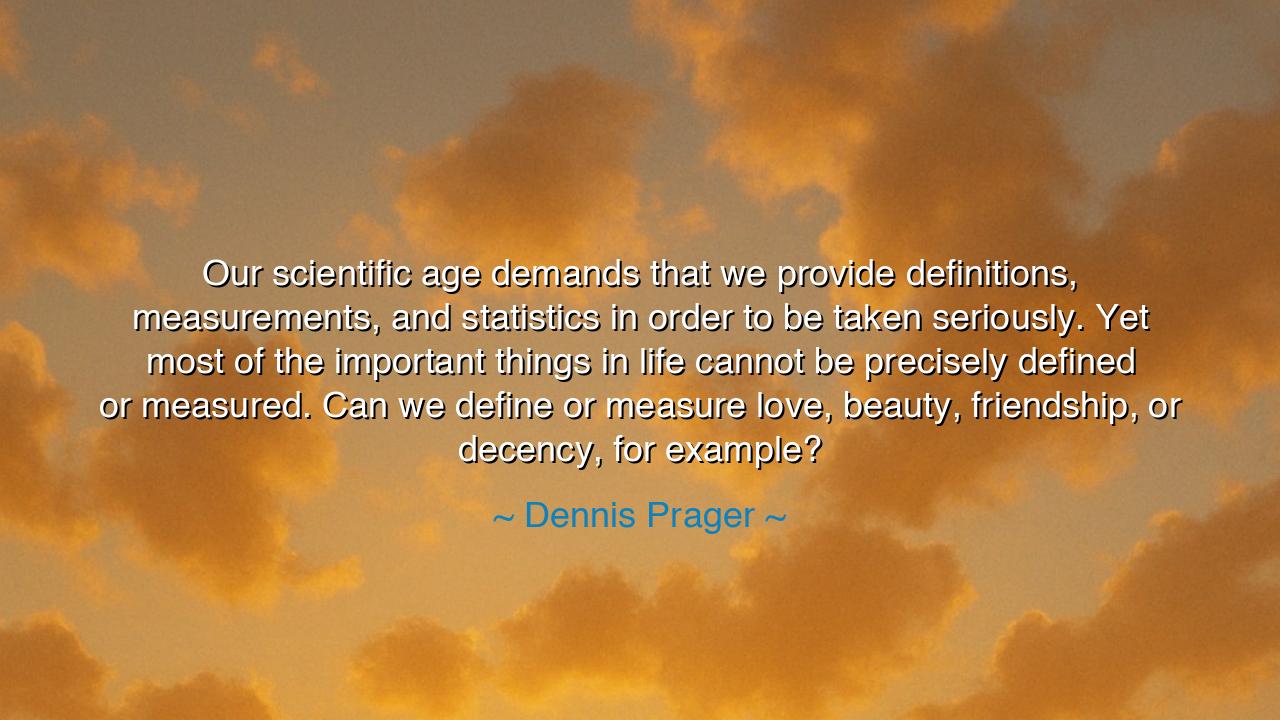
Our scientific age demands that we provide definitions
Our scientific age demands that we provide definitions, measurements, and statistics in order to be taken seriously. Yet most of the important things in life cannot be precisely defined or measured. Can we define or measure love, beauty, friendship, or decency, for example?






“Our scientific age demands that we provide definitions, measurements, and statistics in order to be taken seriously. Yet most of the important things in life cannot be precisely defined or measured. Can we define or measure love, beauty, friendship, or decency, for example?” In these reflective and enduring words, Dennis Prager, the moral philosopher and radio host, confronts one of the great paradoxes of modern civilization — that while knowledge expands, wisdom retreats. He speaks to the danger of a world enthralled by data, where truth is reduced to numbers, and meaning to measurement. Yet, as he reminds us, the deepest realities of life — love, beauty, friendship, and decency — lie forever beyond the reach of instruments or equations.
At its core, this quote warns of the imbalance between the scientific mind and the human heart. The scientific spirit seeks clarity through precision; it wants to weigh, quantify, and prove. It has given humankind immense power — to cure diseases, to traverse continents, to peer into the stars. But this same spirit, when elevated above all else, blinds us to truths that cannot be dissected or graphed. Love cannot be reduced to chemical reactions; beauty does not exist in wavelengths alone. Friendship cannot be plotted on a chart, and decency — that quiet moral grace — cannot be captured in statistics. Prager calls us to remember that wisdom begins where measurement ends, for the greatest values of human life live in the invisible realm of the soul.
The origin of this reflection arises from the growing divide between science and philosophy, a divide that deepened in the modern era. As the scientific method triumphed, many began to view only what could be measured as real. Yet thinkers from antiquity — from Socrates to Pascal — warned against this narrowing of sight. They knew that life’s most important questions are not empirical but moral. “What is justice?” “What is love?” “What makes a life good?” — these cannot be answered by experiment. In echoing this ancient wisdom, Prager reclaims a truth long known to the sages: that the human spirit transcends the laboratory, and that to seek meaning in numbers alone is to lose the poetry of existence.
History offers many examples of this truth. Consider Florence Nightingale, a woman of both science and soul. She revolutionized medicine through data, statistics, and methodical care — yet she never lost sight of the sacredness of compassion. Her success came not merely from charts but from conviction, from seeing human dignity where others saw only patients. Or think of Albert Einstein, who, though a scientist, spoke often of wonder, mystery, and God. “Not everything that counts can be counted,” he said — a sentiment that echoes through Prager’s words. Both Nightingale and Einstein remind us that the heart and the intellect must walk together, for when science forgets reverence, it becomes cold; and when faith forgets reason, it becomes blind.
Prager’s insight also strikes at the emptiness of modern culture, which often worships data while starving for meaning. We measure productivity but not peace, GDP but not goodness. We can calculate the calories in a meal, yet not the love with which it was prepared. We track followers and views, but not the depth of human connection. In such a world, Prager’s question — “Can we measure friendship?” — is both challenge and lament. It reminds us that a civilization obsessed with measurement may lose sight of its humanity. For the things that matter most — the warmth of a smile, the loyalty of a friend, the integrity of a deed — are immeasurable, yet they alone give life its value.
The lesson of this quote is one of humility and balance. Science is a tool, not a creed. It reveals the structure of the universe, but not its purpose. We must honor reason, yet not let it silence wonder. In our personal lives, this means learning to cherish experiences that defy quantification — to value a sunset not for its spectrum but for its silence, a friendship not for its duration but for its depth, an act of kindness not for its recognition but for its righteousness. True wisdom lies in knowing that the heart’s truths are not less real for being unmeasurable; they are more real precisely because they transcend measure.
In practice, this calls us to cultivate both mind and spirit. Learn the language of reason, but also the poetry of love. Seek knowledge, but temper it with empathy. Do not allow the metrics of success to erase the music






AAdministratorAdministrator
Welcome, honored guests. Please leave a comment, we will respond soon